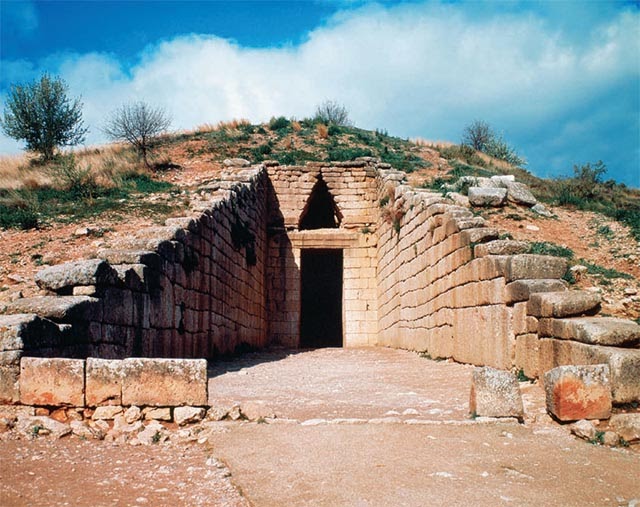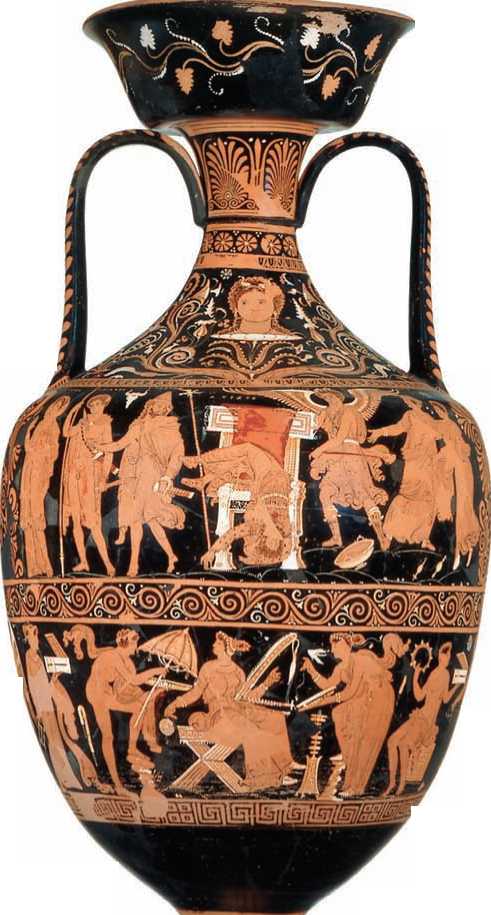House of Atreus
The power, tragedy, and heroes in Greek mythology.

Atreus and his brother Thyestes were sons of Pelops and Hippodameia, they became protagonists of a dramatic story. Pelops, from whom the Peloponnese area took its name, was the son of Tantalus, the king of Sipylus, and Hippodameia was the daughter of Oenomaus, King of Pisa, in Ilia.
Before Pelops could marry Hippodameia, he should first face Oenomaus in a chariot race. If Oenomaus won the fight, then Pelops would be killed, but if Pelops won, then he could marry Hippodameia. In order to secure his victory, Pelops bribed Oenomaus’ charioteer, Myrtilus, to sabotage his chariot. Oenomaus was killed and Pelops gained the right to marry Hippodameia. After the race, however, Myrtilus asked for his reward: Pelops had promised him one night with Hippodameia. Instead, Pelops killed Myrtilus, who before he died he cursed Pelops and his descendants. Based on this version of the story, Myrtilus was the beginning of the curse that plagued the Atreides family.
The House of Atreus was one of the most important dynasties with iconic works in the stories of the ancient Greek dramaturgists. Tradition says that the descendants of Pelops are closely related to colonization and political development in large areas of the northern and central Peloponnese.
Several of Atreus' brothers, for example, are believed to have reigned in important cities in the eastern Peloponnese, such as Troezen, Sicyon, and Epidaurus. Atreus and Thyestes were closely linked to Argolida, including the historic cities of Argos, Mycenae, Tiryns and Nafplion. The sons of Pelops came to Argolida after they were exiled from their father for the murder of Chrysippus, son of Pelops by a nymph who had been married to him before Hippodameia.

As the eldest son, Chrysippus was a heir to the kingdom of Peloponnese. Atreus and Thyestes settled near Mycenae, where the grandson of Perseus, Eurystheus, was the king. Eurystheus' father had married one of the daughters of Pelops, so Eurystheus was nephew of the two brothers. When Eurystheus died, an oracle prophesied that one of the two sons of Pelops would inherit the throne. Atreas, who was the older brother, had the strongest claim to the Mycenaean throne, but Thyestes suggested that the one who owned a specific golden sheepskin should become a king.
The golden lamb was given as a cursed present to Athena either by the god Hermes, the father of Myrtilus, or by the goddess Artemis as a test to see if Atreus would willingly sacrifice it to her. Atreus accepted his brother's challenge, believing the sheep to be locked somewhere safely. Although Atreus did not know, Thyestes had seduced the wife of Atreus, Aerope, and persuaded her to give him the golden sheepskin.

While in exile, Thyestes learned from Delphi's oracle that he would have to make a son with his own daughter, Pelopia, to avenge himself. One night he was disguised and slept with his daughter, who did not recognize his real identity. Meanwhile, Atreus had killed Aerope for her infidelity, but not before she gave birth to the sons Agamemnon and Menelaus. Shortly afterwards, on a visit to Sikyon, Atreus fell in love and married Pelopia, whom he believed to be a Princess of Sikyon and daughter of King Thesprotis.
Several months later, Pelopia gave birth to a son, Aegisthus. Without Atreus knowing, the infant was in fact the son of Thyestes, not his. Years later, Atreus sent Aegisthus to a mission to murder Thyestes, whom Atreus had captured and detained in Mycenae. As Aegisthus approached him, Thyestes recognized the sword the young man had over him. The sword had been stolen from his sheath at the time of her rape, and had given it later to Aegisthus.
Instead of the murder of Thyestes, Aegisthus killed Atreus and made his the real father the king of Mycenae.

Today, The House of Atreides is referred to a successful series of science fiction novels named "Dune" by Frank Herbert.